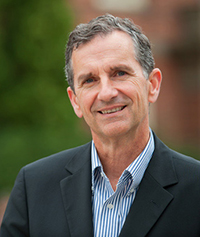
At a recent meeting of the entire WSU development staff, I was struck by the hunger for communication. What’s happening? Who’s doing what? Where are we going? Being near our successful conclusion of the largest demonstration ever of private support with The Campaign for Washington State University, I can relate to the ‘what’s next’ question. I intend to use this forum to regularly communicate to readers, both internal and external, about the future of the WSU Foundation as a catalyst for WSU’s excellence and growth.
In returning to WSU after a three-year absence, the first question I’ve had is what is our value proposition? I know WSU, our land grant legacy, where we’ve been, and want to go. But how is the complexity of all that is WSU conveyed to the public in a thoughtful, comprehensive, and memorable way? For our part, the WSU Foundation tried to capture our last decade in the tagline of the campaign, Because the World Needs Big Ideas. What will we say about our next ten years?
Fortunately, reexaming how we articulate our value proposition is a current task not only for the WSU Foundation, but also for leaders of our research mission and those who work with local, state, and federal government. Universities at their best have the private sector, academia, and government in alignment—so I feel lucky to have colleagues in synch with our needs at the WSU Foundation. I will do all I can to seize the synchrony and invite you to watch the Foundation, but also the Office of Research and Government Relations as we frame WSU’s value for the future.
Beyond getting reacquainted with WSU, I am spending considerable time observing all I can about our development effort with an eye toward what to keep, what to change, and what to start anew. The current campaign has given us plenty of experience in things we’d not really attempted in the past. As June 30, 2015 approaches, we’ll be celebrating our successes, but also taking stock of lessons learned. I’ve been impressed with the willingness of our volunteers in the Board of Governors and Trustees, our staff, the Deans, Directors, and Chancellors – all directly involved in private fundraising—to accept the teachable moment we have and demonstrate the desire to improve.
Among the things I know we can improve are…
- Our volunteer structure. We need to offer a more rewarding experience that conveys the vision, aligns goals, and mobilizes advocacy. Roles and expectations need to be clear.
- A more collaborative structure and relationship among all staff, whether at the central Foundation, a college, or a campus. Relooking at how our performance and accountability is measured could help, and the staff has already recommended other examples, such as at Northwestern. We’ve already begun revising our routine reports, including a measure of return on investment. If we measure collaboration and impact, we’ll get it.
- Anticipating tomorrow’s individual and corporate donor as both are changing rapidly. We’ve done well with individual donors this campaign. How do we maintain that appeal, and also improve our corporate participation in the future?
- Investing in technology to improve our intelligence on prospects, help prioritize effort, and more effectively communicate with donors.
- Being a more proactive contributor to WSU’s overall marketing effort. Fundraisers are on the leading edge of gauging appeal. We need to better inform our colleagues across WSU, especially in admissions, research, and government relations.
It’s a privilege to be working for WSU, particularly during these dynamic times. We’ve demonstrated success and a vision with The Campaign for Washington State University that drew some skepticism initially. It’s time to learn from our achievements, as well as our critics, so as to keep the momentum going. A thriving, relevant and healthy WSU benefits us all.
